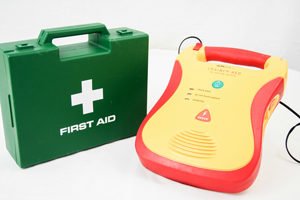
We often learn on First Aid courses what to do if someone around you is having a suspected heart attack, but do you know what to do if YOU suspect you are having a heart attack?
Symptoms of a heart attack can include:
However symptoms can vary from person to person. Some people may have other symptoms such as back or jaw pain without any chest pain. Don’t delay because you think hospitals are too busy – the NHS still has systems in place to treat people for heart attacks. If you delay, you are more likely to suffer serious heart damage and more likely to need intensive care and to spend longer in hospital. It’s important you get medical attention immediately. And you will not be wasting paramedics’ time – a heart attack is a medical emergency. If there is someone with you, ask them to call you an ambulance. If you are alone, try and contact a neighbour or the closest person and ask them to call 999 for you. If this is not possible, call 999 yourself. It’s essential to dial 999 if you have any symptoms that could be a heart attack. If you think you need to be seen before you can speak to your GP but you don’t think you’re having a heart attack, call 111 for an assessment. Don’t try and take yourself to hospital, as the ambulance team will give you the best care and do tests on the way. You should sit down and try to stay calm while you wait for the ambulance. If aspirin is available and you are not allergic to it, slowly chew and then swallow an adult-size tablet (300mg) while you wait for the ambulance. Aspirin helps to thin your blood and improve blood flow to your heart. If you have had a heart attack, it’s important that you rest while you wait for an ambulance, to avoid unnecessary strain on your heart.
There are many things you can do to be healthier and reduce your risk if a heart attack, like:
- keeping active – which has been proven to boost energy, sleep and quality of life
- maintaining a healthy weight and diet – this will help your overall health and prevent extra strain on your heart
- limiting how much alcohol you drink (less than the recommended 14 units per week)
- stopping smoking and using other tobacco products
- controlling high blood pressure, cholesterol levels and blood sugar levels (if you have diabetes).
Everyone aged between 40-74 is eligible for a free NHS Health Check in England. If you have a family history of heart and circulatory disease, it’s important to let your GP know and arrange a health check. Similar schemes are available in Wales, Scotland and Northern Ireland. Contact your GP to find out more.
